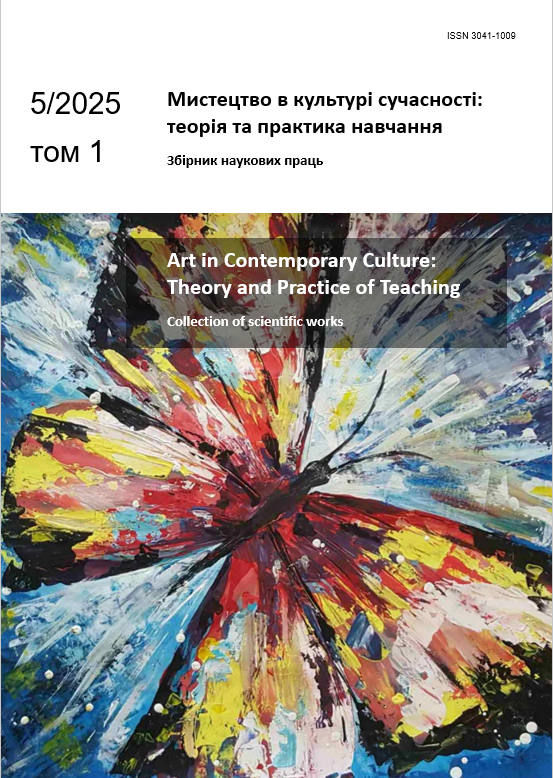MAIN DIRECTIONS OF PROFESSIONAL INSTRUMENTAL - PERFORMANCE TRAINING OF FUTURE TEACHERS OF MUSICAL ART
Published 2025-05-15
Keywords
- instrumental and performance training, music teacher, performance competence, musical education, interpretation of musical works, musical and educational activities

This work is licensed under a Creative Commons Attribution 4.0 International License.
How to Cite
Abstract
The article defines and substantiates the possibilities of training future teachers of musical art on the basis of performance competence in various areas of instrumental education. For a teacher-musician, performing skills are an important sign of readiness for professional activity. Their pedagogical essence consists in a certain motivational, evaluative, theoretical and practical attitude to performance as a creative activity, in controlling one's actions and feelings, managing them, which implies an appropriate attitude to the performance process. It is noted that the improvement of students' performing competence and the ability to apply it in professional activities is based on versatile musical education and performing culture, which collectively form this professional quality. The identified problem becomes particularly relevant in connection with the fact that applicants with different performing training enter music-pedagogical institutions. The author justifies that the instrumental and performing competence of the future music teacher is formed in the following directions: technical and performing (formation of the technique of playing a musical instrument, which involves sound-conducting skills and accuracy of sound-pitch intonation, coordination of hand functions and rationality of movements, mastery of various application techniques and strokes, metro-rhythmic sensitivity, the formation of musical-analytical thinking, the ability for self-analysis and self-improvement); program and repertoire (knowledge of the musical repertoire, the ability to independently select it for students of different age categories; the ability to perform methodical, artistic-pedagogical and performance analysis of musical works); musical-interpretive (the ability to perform interpretation and its direction in pedagogical activity). concert performance (readiness for musical and educational activities). Each direction has its own tasks, which must be taken into account at all stages of professional training. Such orientation of instrumental-performance training is strategically promising in modern conditions, as it is in the sphere of creativity of a musician-performer and allows to successfully solve professional tasks.
Downloads
References
- Апатський В. (1994) Теорія виконавства і методика навчання гри на духових інструментах. 145.
- Андрейко О.І. (2004) Методи вдосконалення виконавського апарату музиканта – інструменталіста. [Дис. канд. пед. наук. НПУ ім. М.П. Драгоманова].185.
- Гусейнова Л. В. (2017) Педагогічні умови формування виконавської культури майбутнього вчителя музичного мистецтва у процесі інструментально-виконавської підготовки. Теорія і методика мистецької освіти. Науковий часопис НПУ ім. М. Драгоманова, (22(27)).1. 55–62.
- Давидов М. (1999) Інтерпретаційні аспекти виконавської майстерності. Науковий вісник НМАУ Музичне виконавство. (2). 88–97.
- Жигінас Т. (2015) Методика підготовки майбутніх учителів музики до концертно-освітньої діяльності. Навчально-методичний посібник. Київ. 123.
- Крицький В. (1999) «Формування уміння художньої інтерпретації студентів музичних факультетів педагогічних закладів вищої освіти». [Автореф. дисертації канд. пед.наук. НПУ ім. М.П. Драгоманова]. 20.
- Мозгальова Н.Г., Барановська І.Г. (2019) Емоційно-інтелектуальний потенціал у розвитку творчої особистості вчителя музики. Актуальні питання мистецької освіти та виховання: наукове видання. 119-127.
- Москаленко В. Г.(2013) Лекції з музичної інтерпретації. Навчальний посібник. Київ. 134.
- П’ятигорський В. М. (2011) Система скрипкової техніки. У 2-х частинах. Теорія. Методичні коментарі. Київ. 120.
- Радван Н. (2015) Проблеми виконавської техніки в контексті становлення і розвитку класичної скрипкової школи. Науковий часопис Національного педагогічного університету імені М. П. Драгоманова. Серія Теорія і методика мистецької освіти: (18(23)). 319–324.
- Сухомлинський В. О. (1976) Проблеми виховання всебічно розвиненої особистості. Вибрані твори: в 5 т. Київ: Радянська школа. (1). 55–206.
- Шульгіна В. Д. (2006) Нариси з історії української музичної культури: монографія. Київ. ДАКККіМ. 108.
- Фрайт І. Чорний Ю. (2022) Методика формування виконавської майстерності скрипаля у педагогічній діяльності Георгія Павлія. Молодь і ринок. №1(199). 87-93.
- Щолокова О. П. (2013) Розповідаємо учням про мистецтво. Навчальний посібник для студентів педагогічних університетів. Київ Вид-цтво НПУ. 166.
- Martienssen C. A. (1957) Die Methodik des individuellen Klavierunterrichts. Leipzig.





